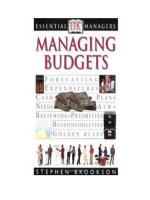THE MANAGING BUDGETS POCKETBOOK phần 1 ppsx
Bạn đang xem bản rút gọn của tài liệu. Xem và tải ngay bản đầy đủ của tài liệu tại đây (149.88 KB, 11 trang )
THE
MANAGING BUDGETS
POCKETBOOK
By Anne Hawkins and Clive Turner
Drawings by Phil Hailstone
“A clear presentation of ‘how to’ in an area of management where there are so many
examples of ‘we didn’t’. It successfully deals with a subject area that is either
mystique-ridden or handled too simplistically, showing that budgets are based on a series
of practical management decisions rather than on one simple technique”.
Peter Nicholls, Head of Investors In People, Walsall Training & Enterprise Council
“Typical of Clive’s excellent teaching standards. It deals with a critical process in a very
readable style, and reflects the very practical experience that both authors have gained
in their careers”.
Andy Stevens, Chief Operating Officer, Messier-Dowty International
CONTENTS
INTRODUCTION 1
FINANCIAL PLANNING 7
What is a Budget, need to plan,
planning for profit and cash, challenge
process, continuous review
REVENUE BUDGETS 29
Budget saboteurs, golden rules,
four stages of setting budgets,
input-output analysis, revisions,
monitoring and controlling
CAPITAL BUDGETS 55
Strategic fit, preparation, authorisation,
evaluation, link to other budgets
PRODUCT COSTING 63
Why it is important, how to
understand the system, challenge
the system, be flexible
APPENDIX ONE 100
Business Financial Model
APPENDIX TWO
Product Costing Example 103
NB
INTRODUCTION
1
INTRODUCTION
ARE YOU MANAGING?
Are you managing your business or is your business managing you?
Do you plan what you are going to do or just react?
2
INTRODUCTION
FAILURE TO PLAN
Has this happened in your business?
Why did it happen?
3
INTRODUCTION
CO-ORDINATE AND CONTROL
Planning is essential for businesses to co-ordinate and
control their activities.
Co-ordinate
Businesses are run by a group of individuals, each of
whom will have a personal view of the best way ahead.
If there is no agreement on where the business is going,
and how it will get there, the team cannot pull together.
Control
Businesses need to measure their progress against
their plan in order to reassess how they are going
to arrive at the agreed destination.
4
INTRODUCTION
CLASSIC CLICHÉS
“I’m too busy to plan” perhaps you’re too busy because you don’t plan!
“My boss plans. I get on with it” but are you pulling in the same direction as the
rest of the team?
“Just get the sales” which sales? Are they profitable? Will the business be
worth winning?
“What’s the point? Things never go according to plan” by planning you are focused on
the future and will respond quicker to the changing environment.
5
INTRODUCTION
PLANNING IS FOR EVERYONE!
Remember
Even the smallest cog in the largest wheel has a vital role to play in the planning process.
Don’t underestimate the significance of your contribution and the damage that can be
inflicted if you get it wrong!
6
FINANCIAL PLANNING
7
FINANCIAL PLANNING
WHAT IS A BUDGET?
A budget is a management tool which underpins the planning and control process within
the business.
Definition:
A budget is telling your money
● Where to go
● Instead of worrying where it went
8
FINANCIAL PLANNING
IS IT NECESSARY?
● Is there a need to budget?
● Is it necessary to plan the finances?
YES!
A business is a sophisticated
money-making machine.
Don’t leave it to chance!
9









